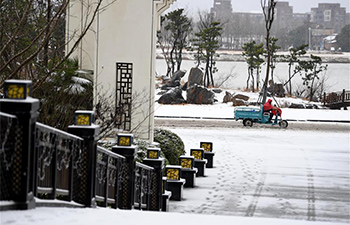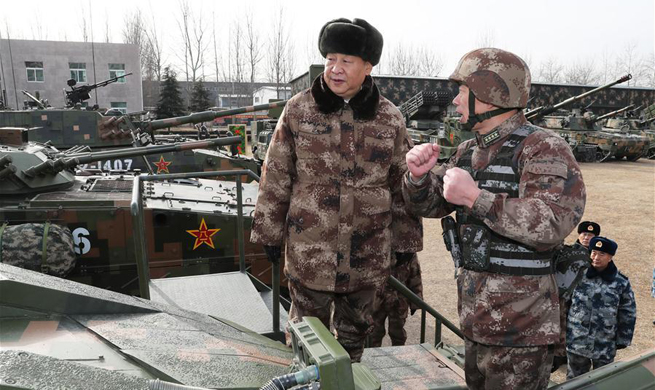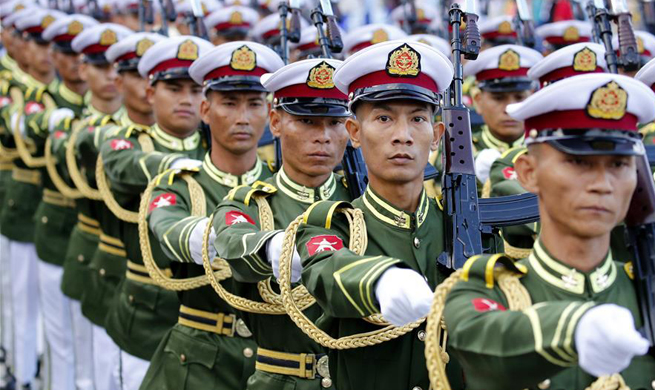by Tao Jun, Dong Hua
HO CHI MINH CITY, Jan. 4 (Xinhua) -- In 2017, Vietnam's economy had another good year of strong growth and broad macroeconomic stability, but some underlying challenges remain, a World Bank (WB) economist told Xinhua recently.
"Most importantly, while showing some tentative signs of recovery, productivity growth remains tepid, weighing on Vietnam's medium term growth potential, especially given weaker labor force and investment growth," Sebastian Eckardt, the WB's lead economist for Vietnam where he coordinates the bank's work on macroeconomics, trade, finance, agriculture, poverty and public sector reforms.
Especially, the domestic sector is lagging behind the strong performance of the foreign direct investment (FDI) sector and linkages between domestic and FDI firms are relatively weak, he said.
"Fiscal risks also remain pronounced, particularly with regard to the quality and pace of fiscal consolidation, which could undermine investment in infrastructure and human capital needed for future growth," the WB economist stated.
Despite progress, notably the recent adoption of the resolution on piloting bad debt settlement at credit institutions and amendments to the law on credit institutions, "there are also some remaining vulnerabilities in the banking sector with a still sizable stock of unresolved non-performing loans and relatively thin capital buffers in some banks," he added.
On the fiscal front, there continues to be a need for deeper revenue and expenditure reforms that lead to real efficiency gains, including broadening tax bases and strengthening tax administration, right-sizing the public administration, and higher value for money in public investment and procurement of goods and services.
"Steps to solidify macroeconomic stability need to be accompanied by progress on structural reforms to lift productivity and potential growth, including steps to reform the state-owned enterprise sector, improve the regulatory environment, and enhance factor markets, including for land and capital," Eckardt proposed.
Overall, the outlook for Vietnam is favorable, especially if the current global recovery continues and domestic reform progress is sustained. "We project growth to stabilize at around 6.5 percent (in 2018) accompanied by broad macroeconomic stability," he said.
This favorable environment provides an opportunity for accelerating and deepening ambitious policies that will raise economic resilience and support growth in the future.
"Macroeconomic resilience could be strengthened by further enhancing exchange rate flexibility, a further buildup of foreign reserves, fiscal consolidation, and responsive monetary and macro-prudential policies that moderate credit expansion and bolster capital buffers in the banking sector," the economist said.
Vietnam's economy grew 6.81 percent in 2017, surpassing the target of 6.7 percent set by its top legislature. It has targeted economic growth of 6.5-6.7 percent in 2018.
According to the economist, growth in 2017 was supported by stronger domestic demand, robust export-oriented manufacturing, and a gradual recovery of the agriculture sector.
"Low inflation and rising real wages sustained buoyant domestic demand and private consumption, while the stronger global economy helped Vietnam's export-oriented manufacturing and agricultural sectors," Eckardt stated.
Vietnam's export performance continued to stand out, recording 21.1 percent expansion in 2017, making Vietnam one of the fastest growing export economies in the world.
"Robust growth was accompanied by sustained macroeconomic stability marked by low single digit inflation, a relatively stable exchange rate, a balance of payment surplus and an improved fiscal position," the economist said.
Job growth continued, with 1.6 million new jobs added in the manufacturing sector over the past three years, and 700,000 additional jobs in the construction, retail, and hospitality sectors, leading to higher aggregate labor productivity.
Labor demand also contributed to rapid wage growth, with average wages estimated to have increased by about 8 percent in 2017, he said.
On Thursday, the Vietnamese government's portal reported that Prime Minister Nguyen Xuan Phuc has assigned the five ministries of Planning and Investment, Agriculture and Rural Development, Industry and Trade, Health, and Labor, Invalids and Social Affairs to realize socioeconomic development targets set for 2018.

















